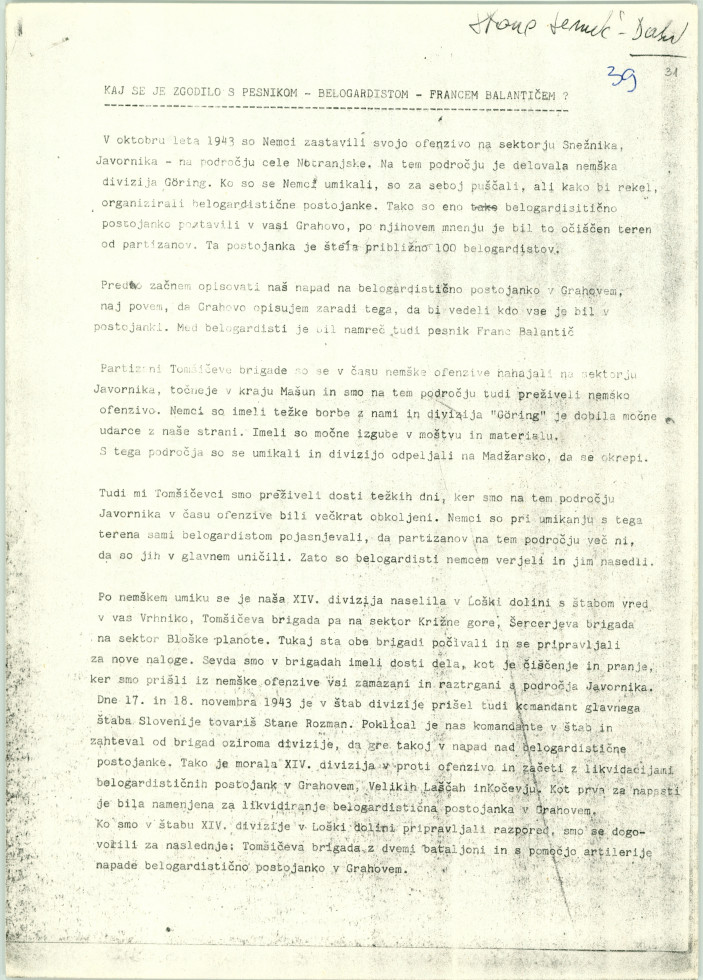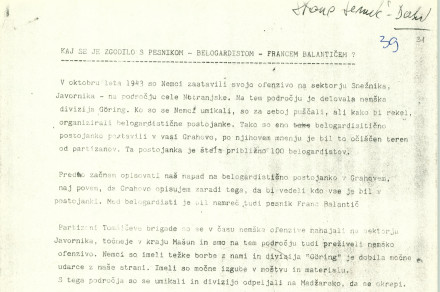»Kajuh Did Everything to Save Balantič, but Balantič Did Not Want to Hear Him Out …«
No date/1970s/
Copy, 8 pages
Reference code: SI AS 1931, Republiški sekretariat za notranje zadeve Socialistične republike Slovenije, box 461, Franc Balantič personal dossier
Memoir Record by Stane Semič About the Meeting of Karel Destovnik and France Balantič During the Time the Home-Guard Post in Grahovo was Destroyed (November 23 and 24, 1943)
This year has been declared the year of the poet Karel Destovnik – Kajuh. Remembering the poet's creative opus and the message of his poetry through various events and projects, we are at the same time commemorating the 101st anniversary of his birth (1922) and the 79th anniversary of his untimely violent death (1944). In Slovenian national consciousness, Kajuh remains firmly rooted as the poet of the Slovenian national resistance against the denationalizing WW2 occupation, as well as the poet who fought for the social change and the creation of a different world.
The year 1943, eighty years ago, saw the premature ending of the lives of many young Slovenian men and women. One of them was France Balantič, another young Slovenian poet, who was born in 1921 and died in November 1943. Like Karel Destovnik, France Balantič died much too soon – both were just twenty-one years old – and also died a violent death. Balantič himself, along with his poetry, acquired a symbolic status immediately after his death. His significance for the anti-partisan and counter-revolutionary camp was expressive already during WW2 – just as Karel Destovnik and his poetry had a symbolic significance for the Slovenian partisan and revolutionary camp. It is precisely because of Balantič’s symbolic significance during the war, combined with the fact that he died as a member of the Slovenian Home Guard, that the post-war social memory of the two poets and their poetic creations differed considerably. While Karel Destovnik went on to became, also through school curriculum, a role model for post-war generations and a symbol of an unyielding stand for things worth fighting for, France Balantič was destined to be forgotten by society and banished from Slovenian collective memory. His memory was kept alive mostly by the Slovenian political emigration, among whom Balantič and his poetry managed to retain the significance he had during the war. Even today, eighty years after their respective deaths, the two poets remain separated in the Slovenian consciousness; they are used as the symbols for the two opposing sides during the war. How one views them, is even today conditioned mostly by how one generally views the events taking place during WW2 in Slovenia.
There is, however, some common ground in the otherwise different life paths of the two poets. In the school year 1941/1942, Karel Destovnik attended the Slavic studies seminar at the University of Ljubljana (though only Balantič was formally enrolled to study Slavic studies), and he was also familiar with Balantič’s poems published in the magazine Dom in svet. Although one can easily believe this to be true, the possibility that the two young poets both found themselves in Grahovo on the night in November 1943 that proved to be fatal for Balantič, seems utterly astonishing. And yet, this is what we can take from a memoir record of Stane Semič, the commander of the Tomšič Brigade at the time of the attack in Grahovo. Preserved in the archival fonds SI AS 1931 among the records that the State Security Service started collecting about France Balantič at the end of the 1950s (due to repeated efforts of Slovenian literary circles to publish his poems), there is also a memoir report of Stane Semič, who at the time was a high ranking partisan officer. His non-dated text titled “What happened to the poet – a White Guard soldier – France Balantič” makes for an unusual reading. In addition to some terminological errors and inconsistencies with other accounts describing the attack of the Tomšič Brigade on the Home Guard post in Grahovo, the text makes a special mention of the participation of Karel Destovnik in these events. The record appears convincing as it includes numerous details. According to the writing, Karel Destovnik in his capacity as the political commissar of the 1st Battalion of the Tomšič Brigade was due to the illness of the battalion’s commander actually in charge of one of the main attacking partisan units, and was also coordinating the attack and its key details with the brigade’s commandant Daki. It also provides an in-depth report on the effort and motives of Karel Destovnik to make sure that France Balantič surrenders or be captured alive. Stane Semič writes about Kajuh’s intervention in favour of Balantič during the Grahovo conflict in other sources as well (but not in his 1972 memoir book Najboljši so padli). His intervention is also mentioned in the 1968 description of the Grahovo attack by Matevž Hace, who during the battle was the political commissar in the Tomšič Brigade.The record on Kajuh’s command and his leading of the partisan unit side by side with the brigade’s commander Stane Semlič, however, remains a unique peculiarity in memoirs and scientific descriptions of the attack on the Home Guard post in Grahovo.
No matter how tempting it is for us readers to believe the conclusions presented in Semič’s text, it is, however, necessary to consider other published literature and reject most of what is narrated in the text about Karel Destovnik and France Balantič. Based on the findings of France Pibernik and Franci Strle, it seems highly unlikely that Karel Destovnik was even present in Grahovo on the night of the attack. Being that he was the leader of the cultural group of the XIV Division, it would have been impossible for him to be acting also as a political commissar in one of the battalions of the Tomšič Brigade. There is also no other evidence that suggests that Kajuh was ever working as a political commissar since he joined the partisans in August 1943.When comparing the available data, it seems possible that Franc Žugel, deputy of the political commissar in Tomšič Brigade, was the one actively involved in the attack at Grahovo alongside Stane Semič. Before the war, Žugel was a student of Slavic studies and he was personally acquainted with France Balantič; if he knew that Balantič was among the Home Guard soldiers in Grahovo on the night of the attack, it might have been him who urged Balantič to surrender. But even this seems highly unlikely, since according to the preserved war testimonies of the two Home Guard soldiers (Anton Strle and Stane Tomažič), who survived the attack in Grahovo, and the post-war testimony of Vinko Šega, a chaplain in Grahovo, there was never any specific mentioning of Balantič’s name among the partisan call for Home Guard soldiers to surrender.
The document presented here as this month’s archivalia (unfortunately) does not bring new findings about Karel Destovnik and France Balantič during the attack of the Tomšič Brigade on the Home Guard post in Grahovo. It does, however, draw attention to the importance of critical study of archival sources and the lack of reliability of memoirs as a source of historical studies.
Tadej Cankar
- Pibernik, France: France Balantič: Življenjska in pesniška pot 1921–1943: Literarna usoda po letu 1945. Ljubljana: Založba ZRC, 2021.
- Semič – Daki, Stane: Najboljši so padli, 3. knjiga. Ljubljana: samozaložba, 1972.
- Strle, Franci: Tomšičeva brigada [3, 1943]. Ljubljana: Naša obramba, 1989.



